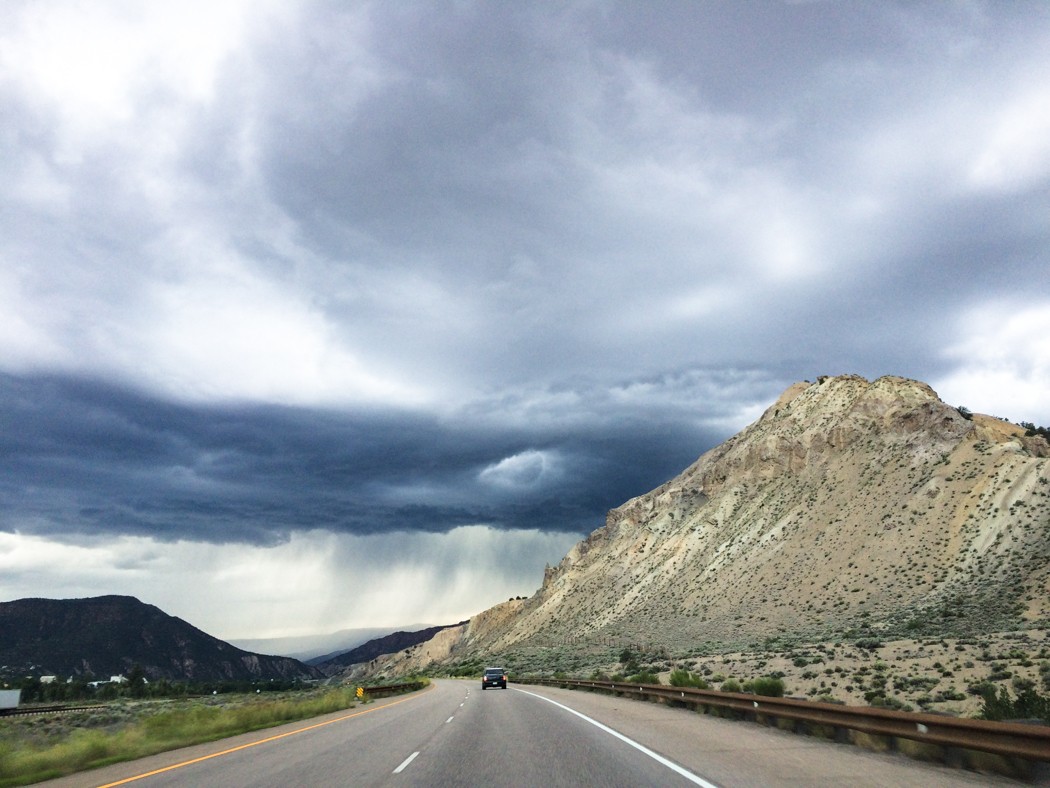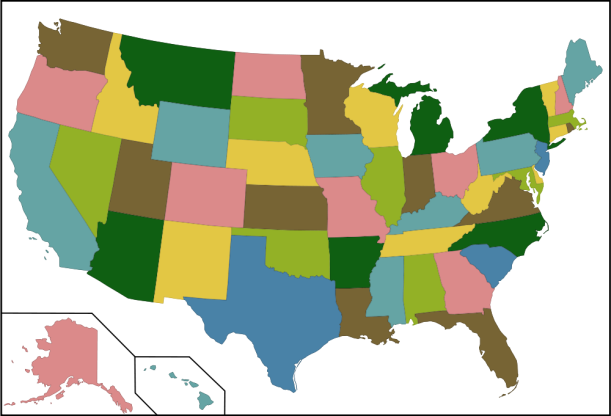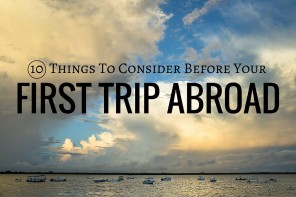In my opinion, a car is often more liability than benefit to a solo traveler in most cases. I hate worrying about parking the rental car, potentially damaging the rental car, insurance issues, potential maintenance issues. If it’s up to me, I’ll just bring less stuff and ride the bus/metro/bicycle/walk/whatever. I feel more free this way.
But rental cars can be a necessity at times, especially in the United States, where rail transit isn’t always a regular and reliable option, equivalent discount air carriers to Europe’s Ryanair and Easyjet do not exist, and the great physical size of the country (3,794,000 sq miles / 9,827,000 km²) might make one crave a little more scheduling/routing freedom than public trans offers.
I often feel like I need to drag my attorney and accountant along to the rental counter when I pick up rental vehicles. The process can be a bit confusing, and if you don’t have a grip on how it works, you may end up spending more than was necessary on the rental itself, or winding up with improper or invalid insurance coverage that could become a big problem in the case of an accident.
The goal is just to have a pain-free rental at the appropriate budget level for you, and to be covered in case things go wrong.
Below is the questions and considerations I suggest every traveler mull over when renting a car in the US.
What car rental company should I rent from?
Rental price quotes can vary pretty considerably between car rental companies.
Bigger and better-advertised car rental companies often have more experienced (and maybe better paid?) staff, more available cars and better support systems for when problems may arise. But their prices are often higher.
In my experience, the smaller companies rent cars for cheaper, but sometimes quote rentals incorrectly, run short of vehicles at inopportune moments, have inefficient or rude rental clerks that tend to push additional fees and insurance options that you might not need, and may not be able to help you with vehicle service if you stray too far from their service area. It’s not always the case, but I’ve experienced it.
On a business rental, I’ll usually go with the most RELIABLE company – usually one of the big boys.
On a personal rental where my time is more flexible and my money is more limited, I’ll brave one of the cheapie rental places in order to save money, despite the possible shortfalls of dealing with less organized companies.
Should I book directly with a given rental car company, or can I book through a travel website?
Booking through sites like Kayak, Travelocity, Expedia, Hotwire, etc (many others not listed) is totally fine and generally comparable in price to direct bookings via vendor sites. Go ahead.
I’ve had success saving a few dollars by “naming my price” on Priceline as well. It’s worth a shot if budget is your main concern and you have no preference of rental agency.
I would recommend checking travel booking site prices against proprietary websites before pulling the trigger, though. Meaning: if you know you would like to rent an Enterprise-Rent-A-Car vehicle through Kayak, check prices at Enterprise.com before you lock things in. Sometimes prices vary in your favor.
Do I need to sign up for/pay for liability insurance coverage at the rental desk?
This depends on your level of personal car insurance. If you own a vehicle and are properly insured with at least state minimum liability coverage, you may not need to pay for additional liability coverage (but please, discuss with your personal car insurance company – don’t take my word for it).
If you do not own a vehicle and carry no personal car insurance, you’ll need liability coverage.
What is CDW (collision damage waiver) insurance, and do I need to pay for it on my rental vehicle?
Collision Damage Waiver insurance covers physical damage and loss/theft of the vehicle. Generally CDW insurance will give you something akin to a $0 deductible for physical damage (though some CDW only kicks in after your personal insurance’s physical damage provisions are depleted). So basically, if you get covered for CDW via the rental agency, you’re protected against paying out the nose for damage for fender benders or worse. Around $25/day is an average cost for CDW coverage – which can add up to a significant amount over time, especially for budget-conscious travelers.
Do you want to be covered against physical damage charges? YES, of course. But there’s an easy way to avoid getting hit for the additional fees: many credit cards provide automatic CDW insurance coverage, provided that you use said card for all rental charges related to the vehicle in question. If you rent vehicles even semi-regularly, you should make sure to hold a credit card that provides physical damage coverage. Many American Express cards, Discover Cards and various Visas will offer this coverage in varying amounts. Check cardmember agreements for specific details.
Can you go without CDW coverage altogether? Yes, but if any physical damage comes to bear, you will be responsible for the cost of repairs. It can get ugly.
Are you taking a one-way trip in your rental car?
Make sure to discuss this early on with the rental agency of your choice. Some car rental companies will charge exorbitant fees for one-way rentals because they have to physically retrieve the car from the place you drop it. Others charge small fees, or nothing. Polices and fees are different with different rental agencies, and in different regions, and change from time to time.
Are you crossing US state lines and/or international borders?
This will affect (and possibly invalidate) insurance coverage. Discuss at the time of rental or prior and make sure the states and/or countries you’ll be visiting are reflected on the rental agreement.
Will one person be driving, or multiple people?
Rental car quotes generally reflect costs for ONE driver of the car. If you want to add another driver beyond the primary, many rental car companies charge around $10/day – though some clerks will waive additional driver fees if you ask nicely at the time of rental.
Be careful to include ALL drivers on the rental agreement at the time of car pickup – otherwise you may have to physically bring both the vehicle AND the additional driver (in person) back to a rental desk when you want to add drivers. It’s a huge pain and time-suck for everyone involved.
Note that if someone NOT listed on the rental agreement has an accident while driving the vehicle, insurance will NOT cover them. Don’t make this mistake!
Does your car rental include unlimited miles?
Most passenger vehicle rentals through known rental agencies do include unlimited miles, but vans and truck rentals are generally billed by the mile. Make sure you know which plan you’re on. Some rental agencies will include extra free miles if you ask nicely or negotiate correctly.
This also tends to vary by vehicle type. If you’re renting a truck or van, rental agencies will often bill by the mile.
Review your rental agreement in detail before you sign it.
Make sure all insurance needs, noted drivers, states you plan to visit and mileage quotas are properly and clearly reflected on the rental agreement you receive at the time of vehicle pickup.
If, god forbid, an accident of any sort should happen, this is the document the rental agency will reference. Don’t take a rental clerk at their word – you need to see all correct details on the document. Most people simply review the rental agreement for noted physical damage on the car and the position of the fuel meter – go one step further and make sure the more important insurance-related stuff is on there as well.
Be kind to your rental desk agent, become familiar and write their name and contact information.
If you have questions about the rental agreement, maintenance requests or otherwise, they could be a great ally to have.
After you answer the above questions you may find that your needs are better served by a different rental agency than you originally anticipated and that the base rental quote you started with may no longer be pertinent to your situation.
Also, if you’re kind, you’re in much better standing to ASK FOR A DISCOUNT on your daily rates, or to ask the rental clerk to waive costs for additional drivers or a vehicle upgrade. Try it. It often works.
Pro Tip: Renting a car from airport locations is often more expensive than off-site rental facilities
Daily rental fees are often considerably higher at airport car rental locations than they are at rental locations short distances away from the airport. I have experienced this in cities like Denver, Colorado and Philadelphia, Pennsylvania. Renting a car in the city itself (Philly), or in an adjacent city (Denver -> Boulder), saved me about half my rental costs! Sometimes it’s worth a cab or metro ride to lower your costs.
The grand caveat of this: many non-airport locations are NOT open 24 hours, so pickup and drop is difficult for travelers on tight schedules.
Good luck and safe driving!
– Matt








